Related Research Articles
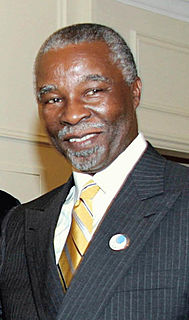
Thabo Mvuyelwa Mbeki is a South African politician who was the second president of South Africa from 14 June 1999 to 24 September 2008, when he resigned at the request of his party, the African National Congress (ANC). Before that, he was deputy president under Nelson Mandela between 1994 and 1999.

Trevor Andrew Manuel is a South African politician who served in the government of South Africa as Minister of Finance from 1996 to 2009, during the presidencies of Nelson Mandela, Thabo Mbeki and Kgalema Motlanthe, and subsequently as Minister in the Presidency for the National Planning Commission from 2009 to 2014 under former President Jacob Zuma.

Baleka Mbete is a South African politician who served as the Speaker of the National Assembly of South Africa from May 2014 to May 2019. She was previously Speaker of the National Assembly from 2004 to 2008, and Deputy President of South Africa from 2008 to 2009 under Kgalema Motlanthe. She was elected National Chairperson of the African National Congress in 2007 and re-elected in 2012 and served until 18 December 2017. On the 18th of December 2017, during the ANC's 54th conference, Gwede Mantashe was elected Mbete's successor as National Chairperson of the ANC.
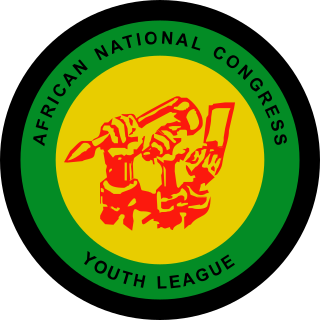
The African National Congress Youth League (ANCYL) is the youth wing of the African National Congress (ANC). As set out in its constitution, the ANC Youth League is led by a National Executive Committee (NEC) and a National Working Committee (NWC).

Mosiuoa Gerard Patrick Lekota is a South African politician, who currently serves as the President and Leader of the Congress of the People since 16 December 2008.
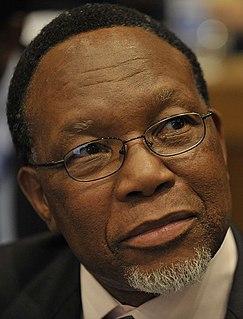
Kgalema Petrus Motlanthe is a South African politician who was South Africa's third president between 25 September 2008 and 9 May 2009, following Thabo Mbeki’s resignation. Thereafter, he was deputy president under Jacob Zuma until 26 May 2014.

South Africa since 1994 transitioned from the system of apartheid to one of majority rule. The election of 1994 resulted in a change in government with the African National Congress (ANC) coming to power. The ANC retained power after subsequent elections in 1999, 2004, 2009, 2014, and 2019. Children born during this period are known as the born-free generation, and those aged eighteen or older, were able to vote for the first time in 2014.

General elections were held in South Africa on 22 April 2009 to elect members of the National Assembly and provincial legislatures. These were the fourth general elections held since the end of the apartheid era.
Joel Netshitenzhe was head of the policy and coordination advisory unit in the presidency until the end of December 2009. He previously served as head of South Africa's Government Communication and Information Systems (GCIS) from 1998 to 2006.

The 52nd National Conference of the African National Congress (ANC) was held in Polokwane, Limpopo, from 16 to 20 December 2007. At the conference, Jacob Zuma and his supporters were elected to the party's top leadership and National Executive Committee (NEC), dealing a significant defeat to national President Thabo Mbeki, who had sought a third term in the ANC presidency. The conference was a precursor to the general election of 2009, which the ANC was extremely likely to win and which did indeed lead to Zuma's ascension to the presidency of South Africa. Mbeki was prohibited from serving a third term as national President but, if re-elected ANC President, could likely have leveraged that office to select his successor.
The National Executive Committee (NEC) of the African National Congress (ANC) is the party's chief executive organ. It is elected every five years at the party national conference; the executive committee, in turn, elects a National Working Committee for day-to-day decision-making responsibilities. At the NEC's head is the President of the ANC, and it also contains the other so-called "Top Six" leaders: the Deputy President, Chairperson, Secretary-General, Deputy Secretary-General, and Treasurer-General.

The 51st National Conference of the African National Congress (ANC) was held at the University of Stellenbosch in Stellenbosch, Western Cape, from 16 to 20 December 2002, during the ANC's 90th anniversary. President Thabo Mbeki was re-elected to the party presidency and, notably, there was no change in other five top leadership positions except for Deputy Secretary General. There was also little competition for other spots on the National Executive Committee (NEC). This ANC conference has thus been called "the quietest in its history."
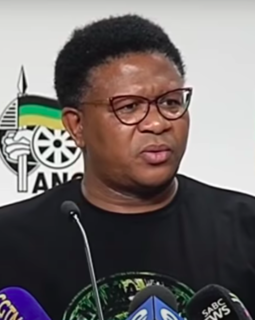
Fikile April Mbalula is a South African politician who is currently serving as Minister of Transport. He previously served as both Minister and Deputy Minister of Police and Minister of Sports and Recreation. Mbalula is a member of the National Executive Committee of the African National Congress and former leader of the African National Congress Youth League. He is ethnically a Mpondomise, his clan name is Jola. Mbalula also serves as the head of elections for the African National Congress.
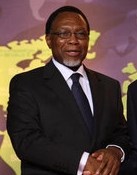
An indirect presidential election was held in South Africa on 25 September 2008 following the resignation of the President Thabo Mbeki. The ruling party, the African National Congress (ANC), with a two-thirds majority in the National Assembly of South Africa, elected Kgalema Motlanthe as president. The ANC indicated that Motlanthe would be a "caretaker" president until the 2009 election, after which ANC president Jacob Zuma would take office.

The African National Congress (ANC) has been the governing party of the Republic of South Africa since 1994. The ANC was founded on 8 January 1912 in Bloemfontein and is the oldest liberation movement in Africa.

The Congress of the People (COPE) is a South African political party formed in 2008 by former members of the African National Congress (ANC). The party was founded by former ANC members Mosiuoa Lekota, Mbhazima Shilowa and Mluleki George to contest the 2009 general election. The party was announced following a national convention held in Sandton on 1 November 2008, and was founded at a congress held in Bloemfontein on 16 December 2008. The name echoes the 1955 Congress of the People at which the Freedom Charter was adopted by the ANC and other parties, a name strongly contested by the ANC in a legal move dismissed by the Pretoria High Court.

The 53rd National Conference of the African National Congress (ANC) was held in Mangaung, Free State from 16 to 20 December 2012, during the centenary of the ANC's establishment, also in Mangaung. It re-elected incumbent President Jacob Zuma and his supporters to the party's top leadership and National Executive Committee (NEC), solidly defeating an opposing group that had coalesced around presidential challenger Deputy President Kgalema Motlanthe.

The 50th National Conference of the African National Congress (ANC) took place from 16 to 20 December 1997 at the University of the North West in what was then called Mafikeng. Attended by 3,000 voting delegates, the conference elected a successor to outgoing ANC President Nelson Mandela, who declined to stand for another term. Thabo Mbeki was elected unopposed, and Jacob Zuma was elected unopposed as his deputy; they were later elected President and Deputy President of the country in the 1999 general elections, in which the ANC won 66.35%, a notable increase from 62.65% in 1994.

The 49th National Conference of the African National Congress (ANC) was held from 17 to 22 December 1994 in Bloemfontein, the city in which the ANC was founded. The conference took place several months after the South Africa's first democratic elections, at which the ANC had won 62.65% of the national vote and incumbent ANC President Nelson Mandela had been elected national President. It was therefore the ANC's first national conference as a ruling party, and only its second national conference since its unbanning in 1990. The theme of the conference was "From Resistance to Reconstruction and Nation-Building." Attended by 2,719 voting delegates, it was held at the University of the Free State, which Mandela said was remarkable, given that the university had "condemned [the ANC] as subversive, as treasonable" during apartheid.

The 54th National Conference of the African National Congress (ANC) took place from 16 to 20 December 2017 at the Johannesburg Expo Centre in Nasrec, Gauteng. At the conference, the ANC elected its National Executive Committee (NEC) and other top internal leaders. Often referred to as the Nasrec Conference, it was held during the centenary of the birth of former ANC President Oliver Tambo and was convened under the theme, "Remember Tambo: Towards Unity, Renewal and Radical Socioeconomic Transformation."
References
- ↑ van Niekerk, Piet (2007-12-21). "The week the ANC split". Daily Dispatch. Retrieved 2008-09-21.
- ↑ "Zuma to give first party presidential address". SABC news. 2007-12-20. Archived from the original on December 23, 2007. Retrieved 2008-09-21.
- ↑ "Results for the election of ANC officials". ANC. Archived from the original on 2008-06-29. Retrieved 2008-09-21.
- ↑ "ANC National Working Committee". ANC. Archived from the original on 2008-05-22. Retrieved 2008-09-21.
- ↑ "Newly-elected National Executive Committee". ANC. Archived from the original on 2008-05-08. Retrieved 2008-09-21.
- ↑ "ANC National Executive Committee". ANC. Archived from the original on 2008-06-22. Retrieved 2008-09-21.